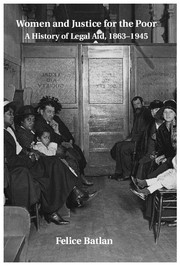Book contents
- Frontmatter
- Contents
- List of Plates
- Acknowledgments
- Abbreviations of Primary Organizations
- Introduction
- PART I A FEMALE DOMINION OF LEGAL AID, 1863–1910
- 1 The Origins of Legal Aid
- 2 The Chicago Experience: The Maturation of Women's Legal Aid
- PART II THE PROFESSIONALIZATION OF LEGAL AID, 1890–1921
- PART III DIALOGUES: LAWYERS AND SOCIAL WORKERS, 1921–1945
- Conclusion
- Index
- Plate Section
1 - The Origins of Legal Aid
from PART I - A FEMALE DOMINION OF LEGAL AID, 1863–1910
Published online by Cambridge University Press: 05 May 2015
- Frontmatter
- Contents
- List of Plates
- Acknowledgments
- Abbreviations of Primary Organizations
- Introduction
- PART I A FEMALE DOMINION OF LEGAL AID, 1863–1910
- 1 The Origins of Legal Aid
- 2 The Chicago Experience: The Maturation of Women's Legal Aid
- PART II THE PROFESSIONALIZATION OF LEGAL AID, 1890–1921
- PART III DIALOGUES: LAWYERS AND SOCIAL WORKERS, 1921–1945
- Conclusion
- Index
- Plate Section
Summary
Organized legal aid began with the founding of the Working Women's Protective Union in New York City in 1863. In part, it was an attempt to quell working women's own protests regarding their low pay and poor employment conditions. Instead of labor organizing, the union devoted itself to providing legal services to impoverished and working-class women who had wage claims against their employers. Although the union long presented its legal work as being carried out by male lawyers, the reality was that its full-time staff of women lay lawyers conducted most of the work, including its legal work. Much like the history of legal aid in general, such women's work was hidden. Recognizing their work would have called into question not only the altruism of the male bar but also what constituted the practice of law and whether it was appropriate for women to be lawyers.
During the Civil War, New York City suffered from significant wartime inflation – as did much of the nation – and segments of the working class responded with outbursts of collective action, including strikes. Prices had risen dramatically on everyday goods, but workers' wages stagnated. Machinists and other skilled male workers, who earned about $2.00 a day, complained that they could no longer live on such wages. By contrast, in the sewing trades, an industry employing large numbers of white and immigrant women both in factories and at home, women earned about $2.50 a week. As one newspaper reported, “[Women's wages] have been so depreciated that it is scarcely possible to realize how anyone could live from the proceeds of such work.”
In the fall of 1863, male skilled workers called for a citywide strike by all laborers; women workers, in the sewing and notions trades, soon began engaging in their own labor agitation. Sympathetic newspapers published letters from women complaining about the unfair practices of employers, low wages, long hours, and dehumanizing treatment. This nascent labor movement attracted hundreds of women, who attended citywide meetings. These working women, along with a number of male allies, formed the Working Women's Union, which was open to all working women.
- Type
- Chapter
- Information
- Women and Justice for the PoorA History of Legal Aid, 1863–1945, pp. 17 - 46Publisher: Cambridge University PressPrint publication year: 2015
- 1
- Cited by

